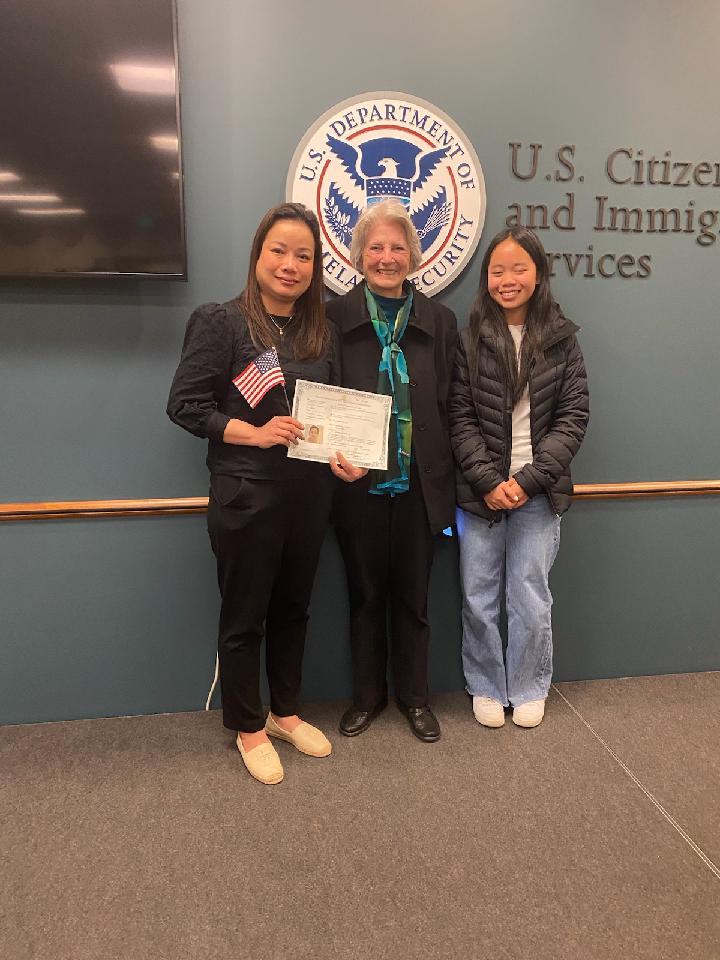
Phanin and Parainna
Life-changing moments are often deeply emotional, and even this seasoned reporter found tears welling in her eyes listening to Phanin Toun share her recent journey to becoming a US citizen.
Born in Cambodia, Phanin said life was really tough, with limited job opportunities. Then, if you have kids, you can only hope they will achieve their dreams, but the chances of that happening are slim. So in 2017, she moved to the States with her two children, Parainna Chan (now 15 years old) and Yongkhieng Chan, now 12.
Phanin knows she didn’t have much choice in her country, but just ask Parainna what she wants to be, and she’ll tell you ‘an accountant, or a fashion designer, or even work in a bank.’ Yongkhieng? Well, he dreams of being a pilot and enjoys engineering, his mother said. For now, they are just dreams, but dreams made attainable through their mother’s perseverance and hard work.
Phanin credits Chesapeake Multicultural Resource Center (ChesMRC). She learned about their citizenship program from a customer at her job. Phanin discovered their citizenship program through a customer and met Matthew Peters, the Executive Director of ChesMRC, who guided her through the naturalization application last year.
Said Peters, “It used to be that the interview could take anywhere between eight months to a year and a half after applying. So, if their English was okay but not great, that time became a great motivator to get that last bit of English cleaned up. However, that interview time has recently sped up to about three or four months. So it’s a little more tricky now and becomes the biggest challenge.”

Phanin, Parainna, and Blair Potter
The US Citizenship and Immigration Service puts out a book with 100 questions and answers dealing with US civics (history and government). People applying for citizenship must demonstrate sufficient knowledge and understanding by correctly answering at least six of 10 questions.
It is no easy task, especially for people new to the country. Phanin is a success story for ChesMRC because she came when they had extra support to get her over the finish line. “I’ve had clients before,” said Peters, “that promise to study. They don’t, and they fail their interview. When Phanin needed that little push, one of the volunteers stepped up and gave her personalized classes focusing on exactly what she needed to get to the endpoint.”
The volunteer was Blair Potter, who admits they had some very intense meetings and a lot of hard work over the short time they had to prepare for the interview. The time was much more intense because, as Phanin admits, her spoken English is not very good, and she can’t read the language well, much less write it. It was hard, Phanin said, very hard.
There was a lot of memorization, late nights, classes, and personal coaching from Potter. As for challenges above and beyond the language barrier, Potter said, it is making sure that people feel they can do it. “It’s all about self-confidence. It’s obvious that Phanin is intelligent and hardworking. And those questions! It’s American civics, its government, and its history. And I would be interested knowing how many of our graduating high school seniors can pass this test.”
When the time came, Phanin managed to pass the writing and the reading, but the spoken part was difficult for her, made more challenging by an interviewer that Phanin described as having an ‘unhappy face.’ She said the examiner spoke fast and wouldn’t repeat the questions despite being asked, which goes against what the students had been taught. “We tell them, first of all,” said Potter, “never answer a question you don’t understand. And second, if you don’t understand the way it’s phrased or the words they’re using, ask them to repeat it, and you have a perfect right to ask him to repeat it more than once.”
She did not pass. She made another appointment and, the next time, saw a more sympathetic interviewer. Phanin finally got her citizenship. Phanin recounted all of this with tears in her eyes; you could tell how important this was to her and her family. “The dedication and the work it takes to do this,” said Potter. “is impressive.” Now, It also means that Phanin’s son, Yongkhieng, can be fast-tracked for his citizenship.
Beyond a success story, Phanin’s journey is what ChesMRC is all about. “That’s why we do what we do,” said Peters,” because we all know every case could eventually end up with this citizenship. For us, it’s a relief. For our clients, it’s such a huge accomplishment. We’ve seen time and time again once we get someone through the green card process and then the citizenship process, it’s truly magical how that immense weight is taken off them. And then we’ll hear them say they’d like to try things they could never do before, travel more, or get involved in the community. And then, of course, the benefits to their family are huge as well. It just really changes the landscape. Once that happens, everything just gets more manageable.”
We couldn’t help but ask Phanin for her advice to others just starting their path to citizenship. “Stay strong and study hard,” she said, “and you will accomplish everything you want in life.”
This maxim succinctly captures the perseverance and resolve that fueled her accomplishment, one which can be applied to overcoming many of life’s obstacles.
For more information on how you can help or be helped by Chesapeake Multicultural Resource Center, go to: https://chesmrc.org.


Maggie Andersen says
What a lovely report and it was nice meeting you in class today Val! Maggie (Margaret) Andersen
Dan Watson says
ChesMRC rocks!